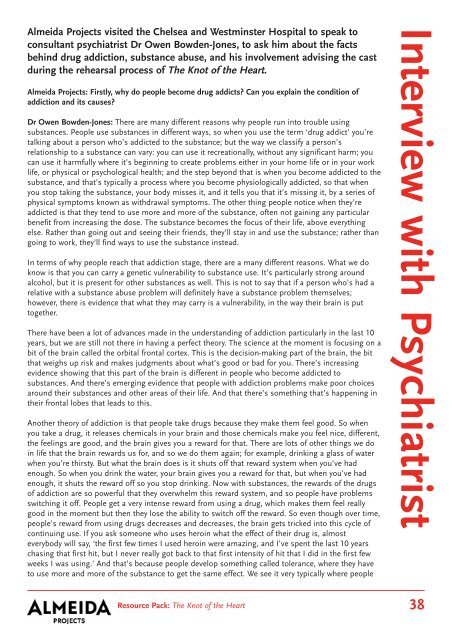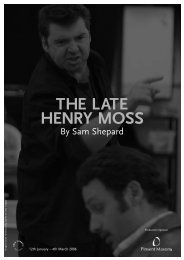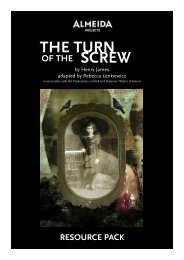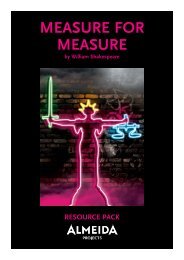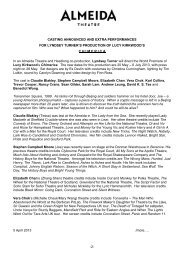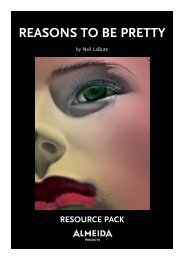KNOT HEART - Almeida Theatre
KNOT HEART - Almeida Theatre
KNOT HEART - Almeida Theatre
- No tags were found...
You also want an ePaper? Increase the reach of your titles
YUMPU automatically turns print PDFs into web optimized ePapers that Google loves.
<strong>Almeida</strong> Projects visited the Chelsea and Westminster Hospital to speak toconsultant psychiatrist Dr Owen Bowden-Jones, to ask him about the factsbehind drug addiction, substance abuse, and his involvement advising the castduring the rehearsal process of The Knot of the Heart.<strong>Almeida</strong> Projects: Firstly, why do people become drug addicts? Can you explain the condition ofaddiction and its causes?Dr Owen Bowden-Jones: There are many different reasons why people run into trouble usingsubstances. People use substances in different ways, so when you use the term ‘drug addict’ you’retalking about a person who’s addicted to the substance; but the way we classify a person’srelationship to a substance can vary: you can use it recreationally, without any significant harm; youcan use it harmfully where it’s beginning to create problems either in your home life or in your worklife, or physical or psychological health; and the step beyond that is when you become addicted to thesubstance, and that’s typically a process where you become physiologically addicted, so that whenyou stop taking the substance, your body misses it, and it tells you that it’s missing it, by a series ofphysical symptoms known as withdrawal symptoms. The other thing people notice when they’readdicted is that they tend to use more and more of the substance, often not gaining any particularbenefit from increasing the dose. The substance becomes the focus of their life, above everythingelse. Rather than going out and seeing their friends, they’ll stay in and use the substance; rather thangoing to work, they’ll find ways to use the substance instead.In terms of why people reach that addiction stage, there are a many different reasons. What we doknow is that you can carry a genetic vulnerability to substance use. It’s particularly strong aroundalcohol, but it is present for other substances as well. This is not to say that if a person who’s had arelative with a substance abuse problem will definitely have a substance problem themselves;however, there is evidence that what they may carry is a vulnerability, in the way their brain is puttogether.There have been a lot of advances made in the understanding of addiction particularly in the last 10years, but we are still not there in having a perfect theory. The science at the moment is focusing on abit of the brain called the orbital frontal cortex. This is the decision-making part of the brain, the bitthat weighs up risk and makes judgments about what’s good or bad for you. There’s increasingevidence showing that this part of the brain is different in people who become addicted tosubstances. And there’s emerging evidence that people with addiction problems make poor choicesaround their substances and other areas of their life. And that there’s something that’s happening intheir frontal lobes that leads to this.Another theory of addiction is that people take drugs because they make them feel good. So whenyou take a drug, it releases chemicals in your brain and those chemicals make you feel nice, different,the feelings are good, and the brain gives you a reward for that. There are lots of other things we doin life that the brain rewards us for, and so we do them again; for example, drinking a glass of waterwhen you’re thirsty. But what the brain does is it shuts off that reward system when you’ve hadenough. So when you drink the water, your brain gives you a reward for that, but when you’ve hadenough, it shuts the reward off so you stop drinking. Now with substances, the rewards of the drugsof addiction are so powerful that they overwhelm this reward system, and so people have problemsswitching it off. People get a very intense reward from using a drug, which makes them feel reallygood in the moment but then they lose the ability to switch off the reward. So even though over time,people’s reward from using drugs decreases and decreases, the brain gets tricked into this cycle ofcontinuing use. If you ask someone who uses heroin what the effect of their drug is, almosteverybody will say, ‘the first few times I used heroin were amazing, and I’ve spent the last 10 yearschasing that first hit, but I never really got back to that first intensity of hit that I did in the first fewweeks I was using.’ And that’s because people develop something called tolerance, where they haveto use more and more of the substance to get the same effect. We see it very typically where peopleInterview with PsychiatristResource Pack: The Knot of the Heart 38


